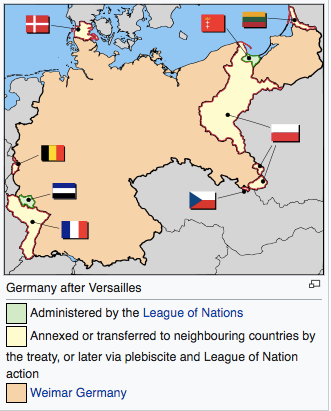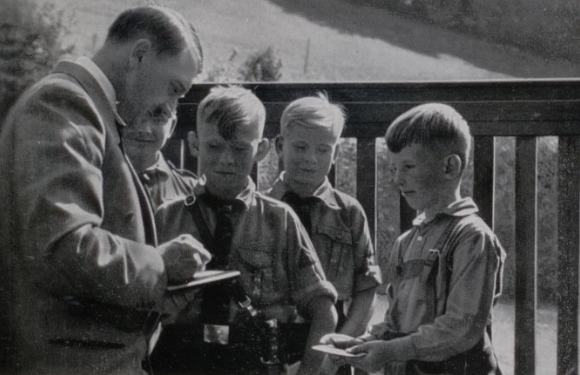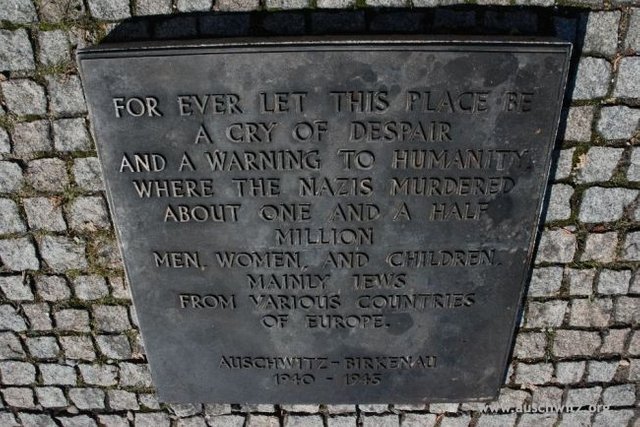Omnipotent Government - The Rise of the Total State & Total War

"For Nazism was not the only conceivable means of dealing with the problems that concern present-day Germany. There was and there is another solution: Free trade. [But] why should this be brushed aside as out of the question? Why did the Germans fail to realize the futility of intetionism and the impracticability of socialism?"
-Ludwig von Mises, Omnipotent Government, 1944
How did the nazis come to power? Did the Germans just all of a sudden embrace nazi ideology and allow Hitler to begin conquering Europe? What was the root cause of nazism in Germany and why was it chosen over Marxian socialism? These are the questions Mises attempts to answer in his 1944 book Omnipotent Government - The Rise of Total State & Total War.
On a personal level, I began reading this book in hopes that I would find answers to these questions and after visiting the bombed out areas of Poland and the concentration camps of Auschwitz and Birkenau [1].

Read: My Visit to Auschwitz-Birkenau and How it Strengthened My Journey Towards Voluntaryism
Mises begins the book by giving the reader a history of what Germany was like when German Liberalism was implemented (liberalism as in the classical liberal variety, not the present day progressive leftist liberals of the statist variety) after the Prussian wars of the nineteenth century (1806). The philosophy and economy that gave Germany prosperity was the Prussian Kings' eagerness to increase wealth of the peasantry. Commerce, trade, mining, agriculture flourished when the peasants were permitted to freely trade among provinces and maintain self ownership. This prosperity lasted almost until the mid to late 19th century when King William I implemented the new German Reich and the rise of German Militarism.
The New Mentality of Statism
According to Mises, Statism (which he refers to as Etatism, since he believes it was an idea imported from France) has two forms, socialism and interventionism. Both subordinating the individual unconditionally to the state, the "Social apparatus of compulsion and coercion."It's appearance in Germany in 1842 was in the first edition of Lorenz von Stein's book, Socialism and Communism in Present-Day France. This was pre-Marxian socialism, but still contained much of the same basic elements, subordination of the individual to the state, tight state controls and regulations on businesses, trade and commerce. In America, progressive thinkers like Frederick List praised the protectionist theories of Alexander Hamilton.
Later in 1847, Marx and Engels published The Communist Manifesto. The ideology took root among Germany's intellectual class and the ideas of laissez-faire and German liberalism that had made the nation so prosperous began to dissolve.
The State

The state is an apparatus of compulsion and coercion in order to compel people through violence to behave otherwise than they would like to behave. However, a gang of thieves in the streets that rob from people is not a state, the mafia is not a state, the pogrom gangs in imperial Russia were not a state. The state is one that is powerful enough to maintain its existence. One main component of a state is territory and sovereignty. If the state has power it must by its nature occupy a surface on the earth which it calls its territory. The state must also have law. But not law in the meaning of universally accepted moral principals, but rules that are forced on the citizenry in order for them to accept one rule.
Mises the Minarchist
Despite Mises' description of the state as an apparatus of violence and coercion, he believed if properly administered, the state could be a tool for human cooperation and civilization. This is where I believe his protege Murray Rothbard as well as others (including me) part ways. A state, given this power by the people, and then told to limit itself has proven throughout history (and throughout this book), that this is simply not possible. The state can only grow and in its parasitic nature, feed off producers.
Bad governments, as Mises describes them, are no more dangerous than a government of incompetent, corrupt, or vile government. The worst evils which mankind ever had to ensure were inflicted by them [bad governments]. The state can be and has often been in the course of history the main source of mischief and disaster.

Statism, Nationalism & the Nazi Ideology
The nazi philosophy that has been contrasted by Soviet Marxian intellectuals and American Progressives contains many similarities to traditional Marxian ideology. The one main component that the new German intellectual classes (professors now comfortably taking root in government to perpetuate new socialist ideas) had to sell to the citizenry was the nationalist myth of German aryan identity. The idea that the population occupying the area of what was now Germany was somehow far superior to their Swedish, Swiss, and other Scandinavian neighbors (the Nordic nations). Yet despite nazi philosophy and science, which was riddled with pseudo science and mythology, being unable to prove or define what a true Aryan was, the intellectuals settled on anyone who speaks German. Through this extreme protectionist and nationalist idea, the new Socialist Worker's party was able to also later perpetuate the myth of the Jewish race (anti-semitism) as the root cause of why Germany had been cast a bad lot and militarism and conquering of nations was necessary to the prosperity of their nation (despite the liberalism and free trade that had propelled the German nation into prosperity nearly 100 years earlier in the first place).

"Again we have a fortunate future" Nazi propaganda poster late 1920's through 1945
National Socialism and Marxism
The Aryan myth and nationalism distinguished Nazism as a different brand of socialism from Marxism or Bolshevism that came about at the turn of the twentieth century. Marxists accused the national socialists of supporting capitalism and the national socialists blamed Marxists for the rise of the Soviet empire. The distinguishing characteristic, according to Mises, was that National Socialism kept the entrepreneur framework in place, however he was no longer an owner but a "shop keeper" who was required by law to set prices given by the central authority. Every business was not permitted to make above a specified amount of the profits and anything in excess must be given up for the good of the State. The National Socialism of the Nazi Party, despite the slight differences in militarism and national identity, is much the same as the socialism of the Marxist variety, which does not allow for private property rights and all profits must be divided and redistributed among the proletariats, the Bourgeoisie class being the enemy (Jewry being the enemy of the Nazis) of the workers.
The Treaty of Versailles used to further Militarism and Conquest of European Territory
In 1919, the Treaty of Versalles was established as well as the League of Nations put forth by president Woodrow Wilson (accepted in October 1918 after German armistice) 14 points of the treaty contained reparations and payback for German aggression during World War I including monetary compensation which was estimated at $33 Billion in 1921. It also gave up territory including sections of Poland (Danzig), areas of East Prussia, and areas of Belgium.

Territorial Evolution of Germany
The German intellectual classes perpetuated the unfairness of this treaty to the masses and it was later used as a justification to conquer neighboring European nations after the National Socialists were elected and Hitler assumed dictatorship as the central authority.
Nazism as a Dangerous Ideology and World Problem
The majority of the German people chose National Socialism above Socialist Democracy (Interventionism) or Marxist Socialism because it offered them a solution to their hardships and promised prosperity through world hegemony.

Hitler was influential and had the charismatic personality, however if Hitler was not to assumed power, Mises says, it would have been another megalomaniac, the problem was interventionism and the ideas of statism themselves vs. the obvious solution of liberalism, peaceful cooperation among nations, and free trade.
Nazi Ideology and Fascism in the World Today & The Alternative
If we (as in people of the world) do not want to repeat the disastrous nature of the past, where millions were murdered by governments and the dangerous ideologies of statism (including fascism, socialism, communism, democratic interventionism e.g. progressivism) the information concerning the dangers of these ideas needs to be readily available. Unfortunately in many countries, including the United States, progressive intellectual classes are still strongly perpetuating the perfect utopia of socialism and state interventionism as a solution to the failings of capitalism, when in reality, capitalism, liberalism and free trade are the true solutions to the problems of war, territory disputes, racism, and poverty. In fact, many of these problems were attempted to be solved by omnipotent governments, only to leave millions dead in gas chambers or of mass starvation. It's time that we stop perpetuating these toxic ideologies and start promoting a philosophy of peace and voluntary cooperation, lest these violent and murderous acts will repeat themselves.

"Let this place be a cry of despair and a warning to humanity, where the Nazis murdered about one and a half million, mainly jews from various countries in Europe." --from Auschwitz.org
Take care.
.jpeg)
The full digital copy of Omnipotent Government as well as the audio book can be found HERE thanks to the Mises Institute.
As always if you got anything out of the above article or my writing and photos, please feel free to give a voluntary donation of Monero (XMR) to the following QR Code or address:
49euXTZHXcnRDy5MrKFHirBRXjKuZtEYujjCKcwrDuCiKBgev7E2DztaFC4JKP4ZCuN8J3Pp971HHFAcph6dujRTTFdNgbh

Congratulations! This post has been upvoted from the communal account, @minnowsupport, by mw480 from the Minnow Support Project. It's a witness project run by aggroed, ausbitbank, teamsteem, someguy123, neoxian, followbtcnews, and netuoso. The goal is to help Steemit grow by supporting Minnows. Please find us at the Peace, Abundance, and Liberty Network (PALnet) Discord Channel. It's a completely public and open space to all members of the Steemit community who voluntarily choose to be there.
If you would like to delegate to the Minnow Support Project you can do so by clicking on the following links: 50SP, 100SP, 250SP, 500SP, 1000SP, 5000SP.
Be sure to leave at least 50SP undelegated on your account.
Congratulations @mwojteck! You have completed the following achievement on the Steem blockchain and have been rewarded with new badge(s) :
Click here to view your Board of Honor
If you no longer want to receive notifications, reply to this comment with the word
STOPDo not miss the last post from @steemitboard: